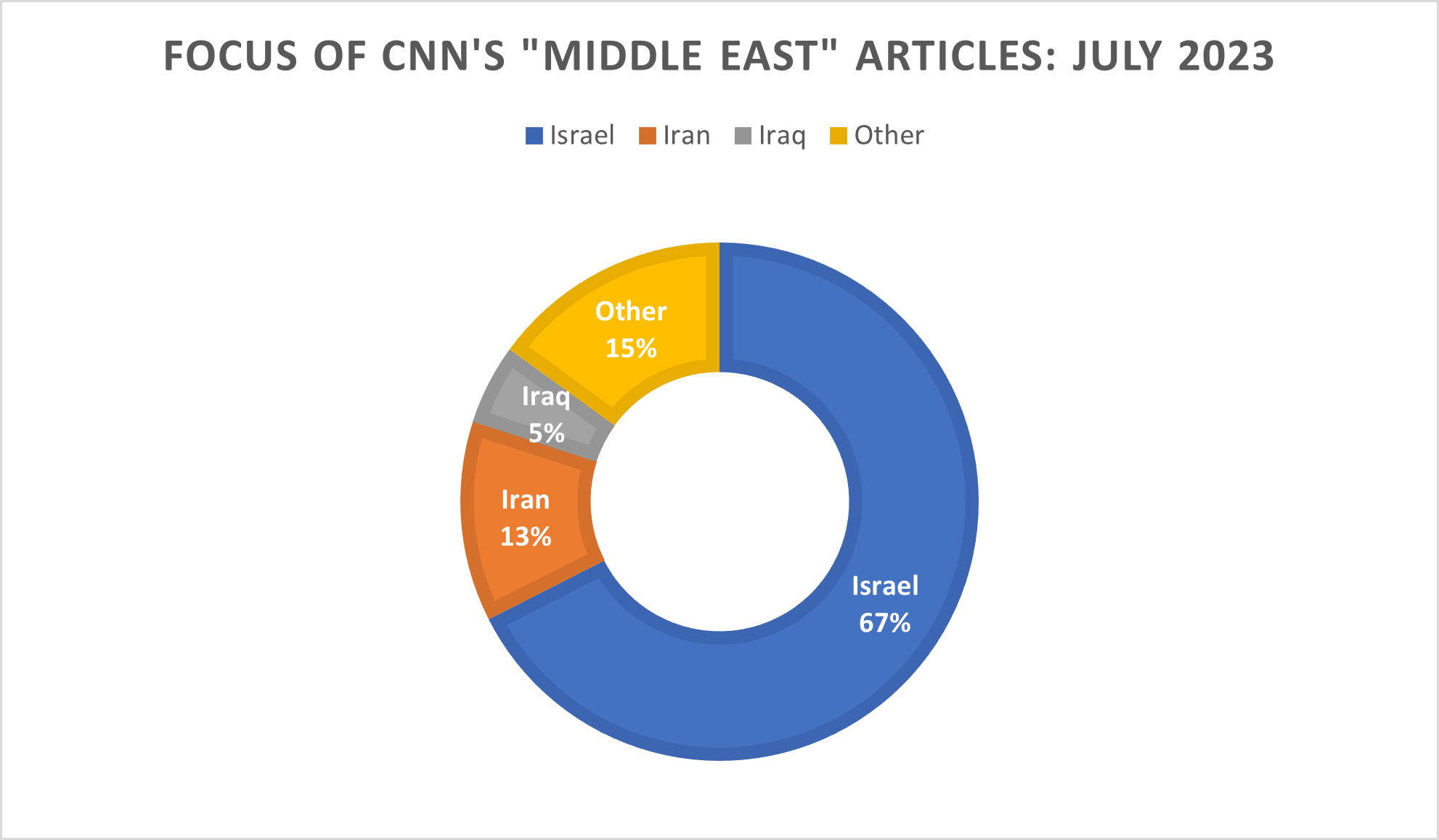According to the World Bank, there are around 493 million people living in the Middle East and North Africa. Approximately 14.6 million of them live in Israel, including the West Bank and the Gaza Strip. That’s slightly less than 3% of the region’s population.
Yet those 3% took up 67% of CNN.com’s coverage of the region during the month of July 2023. The figures put into stark contrast just how obsessive has been the network’s coverage of the Jewish state.
During the month of July, CNN’s “Middle East” section (which includes North African countries, as well as Afghanistan) featured 40 articles. Of those, 27 focused on Israel. Just five focused on Iran, and only two on Iraq. Syria featured in a headline only once, in an article about Israeli strikes (“Israeli warplanes target Syrian air defense battery”).
Put another way, CNN wrote more articles (15) just on Israel’s judicial reform debates than it did on the rest of the region combined (13).
Not even the United Nations Human Rights Council is that obsessed.
Israel does of course deserve coverage and scrutiny like any other country. But the extent to which CNN has pointed its journalistic magnifying glasses toward just one small country in a vast region means that countless worthy stories are left unaddressed. It means that CNN’s audience is left largely ignorant about the realities facing 97% of the people in the region.
Consider some of the stories in July that were left unaddressed on CNN’s website:
- Intra-Palestinian violence in the Ein el-Hilweh “refugee” camp in Lebanon, which has left nearly a dozen dead, forced thousands to flee, and damaged property in the camp, including two schools (See BBC News);
- Growing violence between Houthi rebels and government forces in Yemen over economic infrastructure and resources (See AP News);
- The bolstering of U.S. military forces in the Middle East to counter Iran’s growing threat against commercial ships in the region, including two thwarted attempts to seize oil tankers (See the Wall Street Journal);
- Growing concern over the prospect of Jordan sending refugees back to Syria, notwithstanding the continued human rights abuses of Bashar al-Assad’s regime (See AP News); and
- The anti-migrant tensions and violence in Tunisia, which reached a deal with the European Union on the handling of migrants and economic support for the former (See BBC News).
Even on the topic of Israel, CNN.com’s audience was left without knowledge of important developments and events. While space was found for fifteen articles just on Israel’s judicial reform, stories left unaddressed included: an Israeli taken hostage in Iraq by Iran-backed terrorists; Hezbollah sabotage on the border with Israel; Palestinian protests against Hamas rule in Gaza; the Moroccan king’s invitation to Israeli Prime Minister Benjamin Netanyahu; and the growing prospects of a railway linking Israel and Saudi Arabia.
While the Israeli-Palestinian conflict and the future of Israel’s judicial system are newsworthy topics, they are not particularly unique in the region. Violence and conflict persist in places like Yemen, Syria, Egypt, and Turkey. Lebanon has been collapsing into a failed state, with a U.S.-designated terrorist entity exercising substantial control. And while some activists claim Israel deserves greater scrutiny because it receives American aid (most of which Israel is required to spend on equipment and supplies from American industries), so too do other American allies in the region like Egypt, Jordan, and Iraq.
Contrary to CNN’s apparent belief, no one needs fifteen different iterations of more or less the same story. What CNN.com’s readership does deserve is accurate coverage of the region as a whole, not just what’s happening in one small country.


